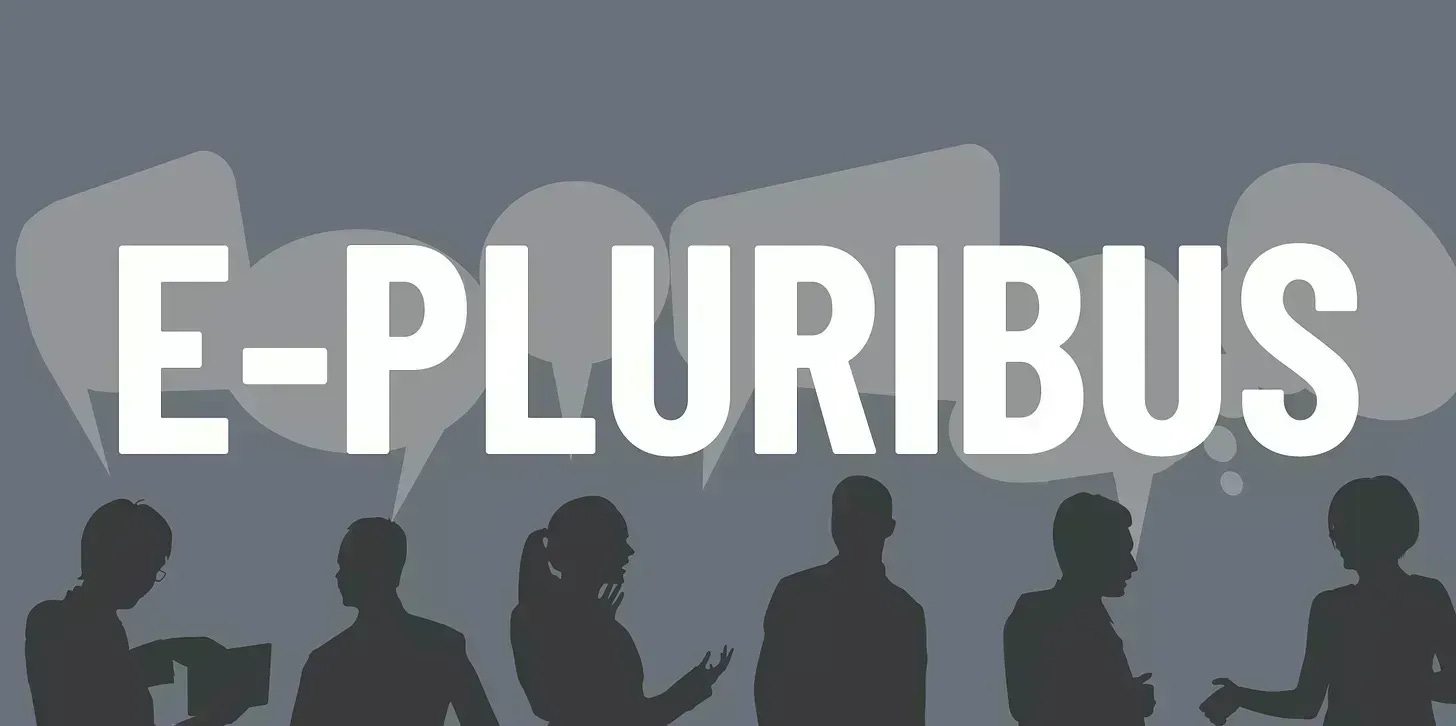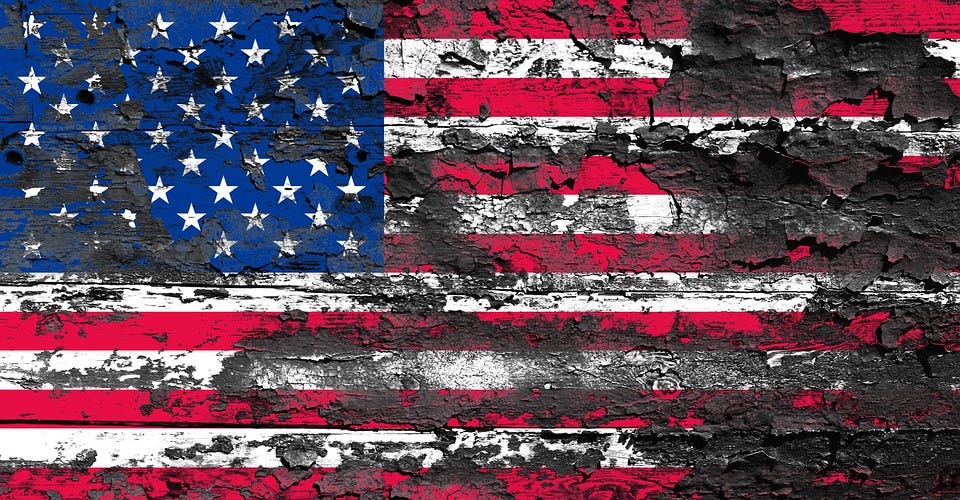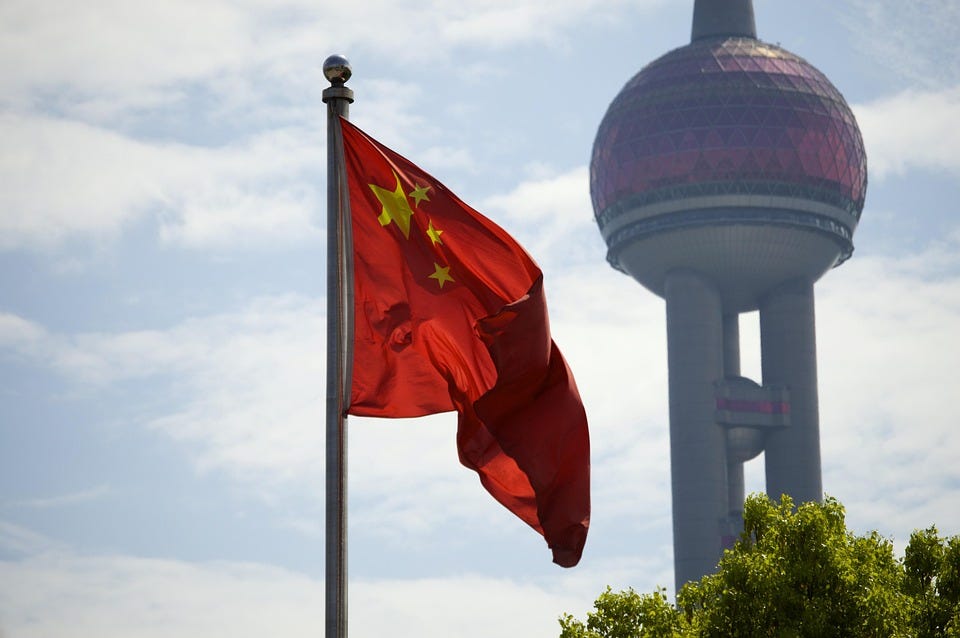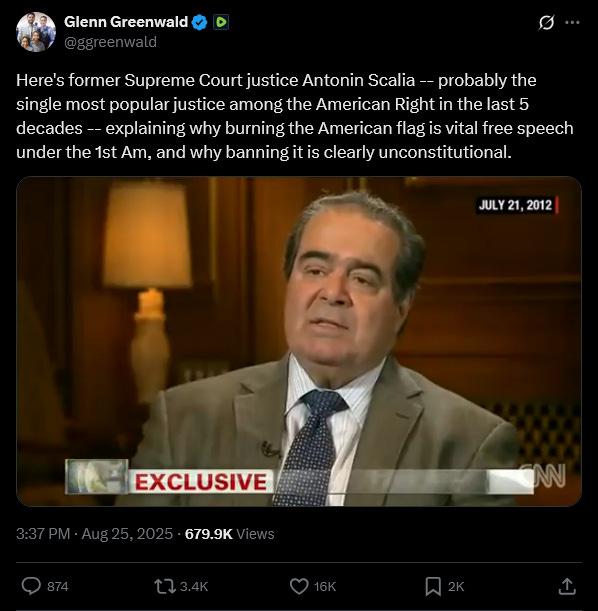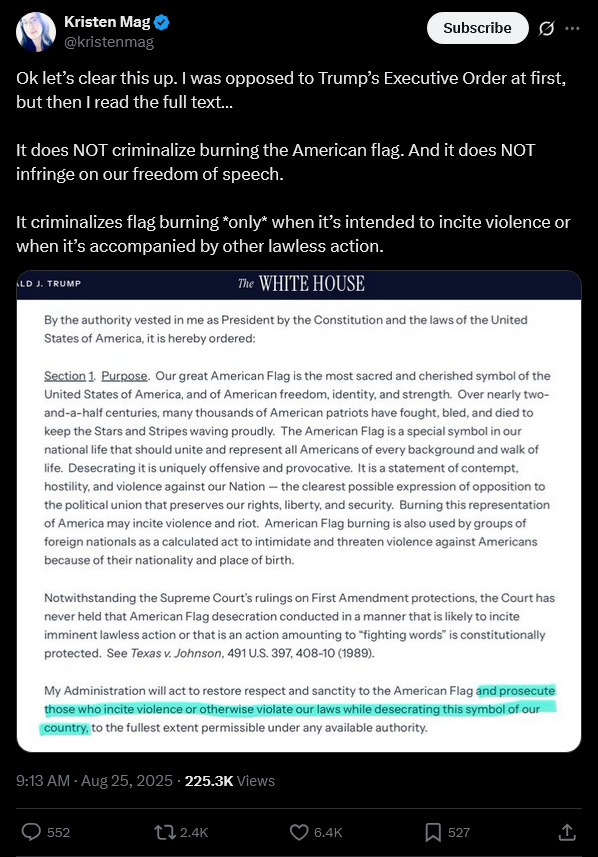E-Pluribus |August 27, 2025
The flag-burning debate. How foreign governments censor US students. Regulate smart phones like booze?
A round-up of the latest and best insight on the rise of illiberalism in the public discourse:
Charles Fain Lehman: For America’s 250th, Pass a Flag-Burning Amendment
After the president signed an executive order prohibiting flag burning under certain circumstances, a ferocious debate erupted over whether the First Amendment protects the act as free speech. At City Journal, Charles Lehman makes the controversial case that we need a Constitutional amendment banning flag burning:
Cases from the colonial period and the Civil War seem to have allowed bans on flag desecration, and the Court upheld a flag desecration statute as late as 1907. While Flanders concludes that an originalist could reach the majority’s conclusion, he argues that this outcome is far less obvious than we might expect.
More sensible, perhaps, is Chief Justice William Rehnquist’s dissent in Johnson, which argued in part that “the public burning of the American flag by Johnson was no essential part of any exposition of ideas, and at the same time it had a tendency to incite a breach of the peace.” This formula, from 1942’s Chaplinsky v. New Hampshire, would have established flag burning as “low-value speech,” not worthy of constitutional protection where it imperiled public order or decency.
“The flag is not simply another ‘idea’ or ‘point of view’ competing for recognition in the marketplace of ideas,” Rehnquist wrote. “Millions and millions of Americans regard it with an almost mystical reverence regardless of what sort of social, political, or philosophical beliefs they may have.” He could not agree “that the First Amendment invalidates the Act of Congress, and the laws of 48 of the 50 States, which make criminal the public burning of the flag.” The Court was installing itself in the role of “a Platonic guardian admonishing those responsible to public opinion as if they were truant schoolchildren,” overriding the express will of the people in doing so.
“Surely,” Rehnquist wrote, “one of the high purposes of a democratic society is to legislate against conduct that is regarded as evil and profoundly offensive to the majority of people—whether it be murder, embezzlement, pollution, or flag burning.”
Leore Tal: New book exposes ‘quiet’ censorship by foreign powers at U.S. universities
Americans are wary of explicit threats to our free speech, outright prohibitions that violate the First Amendment. But we ought to be concerned about subtler, implicit threats to our liberty too. At The College Fix, Leore Tal reviews “Authoritarians in the Academy,” a new book examining how foreign governments pressure US universities to censor their students and faculty:
“There’s sort of a quiet, but deeply serious free speech crisis that’s been going on,” emerging author Sarah McLaughlin says concerning foreign countries’ influence on higher education in the United States.
McLaughlin, a senior scholar of global expression at the Foundation for Individual Rights and Expression, recently authored her first book, “Authoritarians in the Academy: How the Internationalization of Higher Education and Borderless Censorship Threaten Free Speech.”
…
In the book and in her interview with The Fix, McLaughlin explained the two different types of censorship, explicit and implicit.
Explicit censorship, she said, is when there are clear guidelines for what speech is censored and what speech is allowed.
Implicit censorship, on the other hand, is an “indirect pressure where it’s not explicitly stated that the university should censor something … but this implicit feeling that they’re expected to do so if they want to maintain the partnerships that they’re developing with these countries.”
As a result, McLaughlin said foreign governments are able to have a hand in U.S. colleges’ and universities’ curriculum and daily life through donations that keep these institutions running.
…
In one example from the book, McLaughlin writes about a George Washington University incident in 2022 involving controversial artwork connected to the Beijing Winter Olympics.
The posters, which anonymous students hung up around campus, alluded “to the violence against Tibetan monks and Uyghurs, China’s initial cover up of COVID-19, and the country’s extensive surveillance regime” to suggest that China should not host the Olympics.
Some students called for censorship and the GWU Chinese Students and Scholars Association asked the university to “severely” punish those involved.
Elizabeth Nolan Brown: Smartphone Study Authors Say Phones Should Be Regulated Like Alcohol and Tobacco
Many illiberal ideas originate in the academy, though this proposed speech restriction may be the strangest one we’ve seen a university promote: regulate smartphones like tobacco or alcohol. At Reason, Elizabeth Nolan Brown examines a study investigating the mental health impacts of screen time on young children—then makes quick work of the authors’ idea to treat iPads like cigarettes:
A global study finds that owning a cellphone before age 13 is linked to "alarming mental health declines," according to SciTechDaily. The study—"involving more than 100,000 participants"—found that cellphone ownership before the teen years was linked to an increased likelihood of "suicidal thoughts, heightened aggression, feelings of detachment from reality, difficulties with emotional control, and diminished self-worth" at ages 18 to 24.
The authors of the study—which was published in the Journal of Human Development and Capabilities—are urging authorities to adopt policies "similar to those regulating access to alcohol and tobacco."
…
The paper recommends policies including "mandatory education on digital literacy and mental health," age-verification rules for social media and "meaningful penalties for non-compliance," banning social media platforms "on all internet-connected devices for children under 13," and implementing "graduated access restrictions for smartphones." It also says these policies should possibly be extended to apply to anyone under 18.
Noticeably absent from these proposed mandates? An emphasis on parental action.
…
It doesn't help parents or children to condemn all screen time or all cellphone use in the same way, and it certainly doesn't help to have government nannies step in and make it the law of the land. The former is bad because it makes people feel guilty and paranoid about things that can make life easier and are extremely unlikely to have any negative effects. The latter is bad because it leads to invasive schemes that wind up with censorship and privacy invasions for everyone while also blocking teenagers and families from even beneficial uses of technology.
Around X
Flag-burning bans are often portrayed as a conservative cause. Glenn Greenwald reminds us that one of the titans of conservatism, Supreme Court Justice Antonin Scalia, viewed flag burning as protected speech.
Kristen Mag urges critics of the flag-burning executive order to pump the breaks. The order is more narrow than many people originally assumed.
Ugly speech is still free speech, says Greg Lukianoff. We roll back the First Amendment at our own peril.



